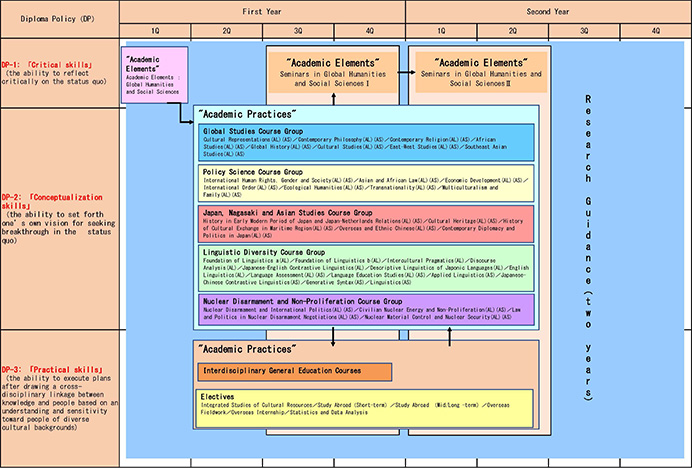Graduate School of Global Humanities and Social Sciences
Curriculum
Educational Outline
”Academic Elements” :Global Humanities and Social Sciences
We will reposition the concepts and theories of the humanities and social sciences in terms of their scholastic foundations – ontology, epistemology, and methodology – and critically examine and reconstruct the scope and limitations of the concepts and theories of each methodology.
Global Studies Course Group
<Objectives>
Based on understanding and empathy for the cultural other from the perspective of the humanities and social sciences, and by connecting knowledge and people in a transcultural manner, we seek specialized solutions to the rejection of and reaction against the diversity of existence and meaning, as seen in the friction and conflict between ethnic groups, religions, cultures, and nations.
<Skills to be Gained>
Critical, conceptualization, and practical skills to create innovation from the integration of heterogeneous elements, based on understanding and empathy for the cultural other
– The friction and conflict between ethnic groups, religions, cultures and nations
– The rejection of and reaction against the diversity of existence and meaning
Policy Science Course Group
<Objectives>
We will pioneer a theory of global policy that harmonizes existing international economics (top-down perspective) with the perspective of the people living on the ground (bottom-up perspective), and seek specialized solutions to problems related to policies, institutions, norms and human security.
<Skills to be Gained>
Critical, conceptualization, and practical skills to conduct policy research and policy analysis by learning about policy issues, their cost-effectiveness, and appropriate policy methods
– Increased risks associated with unbalanced resource allocation
– Policies, institutions, norms and human security
Japan, Nagasaki and Asian Studies Course Group
<Objectives>
From various perspectives based on cooperation between the humanities and social sciences, we seek to provide specialized solutions to the historical, cultural, and social problems that arise in the intersection and convergence of Japan, Asia, and the world.
<Skills to be Gained>
Critical, conceptualization, and practical skills to construct methods and theories that can be developed in a universal dimension while penetrating local contexts
– Historical, cultural and social issues arising from the intersection and convergence of Japan, Asia and the world
Linguistic Diversity Course Group
<Objectives>
By understanding the diversity of linguistics in terms of grammatical and phonetic characteristics, cultural and social rules, and discourse-level characteristics, we seek to provide specialized solutions to problems related to the lack of understanding of the fact that language is the basis for the construction of reality, including the creation of meaning through communication and the act of speaking.
<Skills to be Gained>
A deepened understanding of the universality and individuality of language gained through knowledge in various fields of linguistics, as well as the practical ability to plan and implement English language programs, provide guidance and advice to English language educators, and select expressions suited to a variety of language use situations, communication situations and registers
– Problems related to the lack of understanding of the fact that language is the basis for the construction of reality, such as the reform of rules and the creation of meaning through communication, and the act of speaking
Nuclear Disarmament and Non-Proliferation Course Group
<Objectives>
In the field of nuclear disarmament and non-proliferation, we aim to provide specialized solutions to humanitarian, security, economic and other issues by combining humanities and social sciences with natural sciences, and by combining research and practice (fusion of humanities and sciences).
<Skills to be Gained>
Practical skills in the field of nuclear disarmament and non-proliferation, combining humanities and social sciences with science and engineering, as well as research with practice
– Humanitarian, security, economic and other issues arising from the fact that nuclear disarmament and non-proliferation is an unfinished project
Interdisciplinary General Education Courses
Courses to further broaden interdisciplinary perspectives
Approximately 20 courses offered
Research guidance
Receive research guidance in the student’s chosen course group



